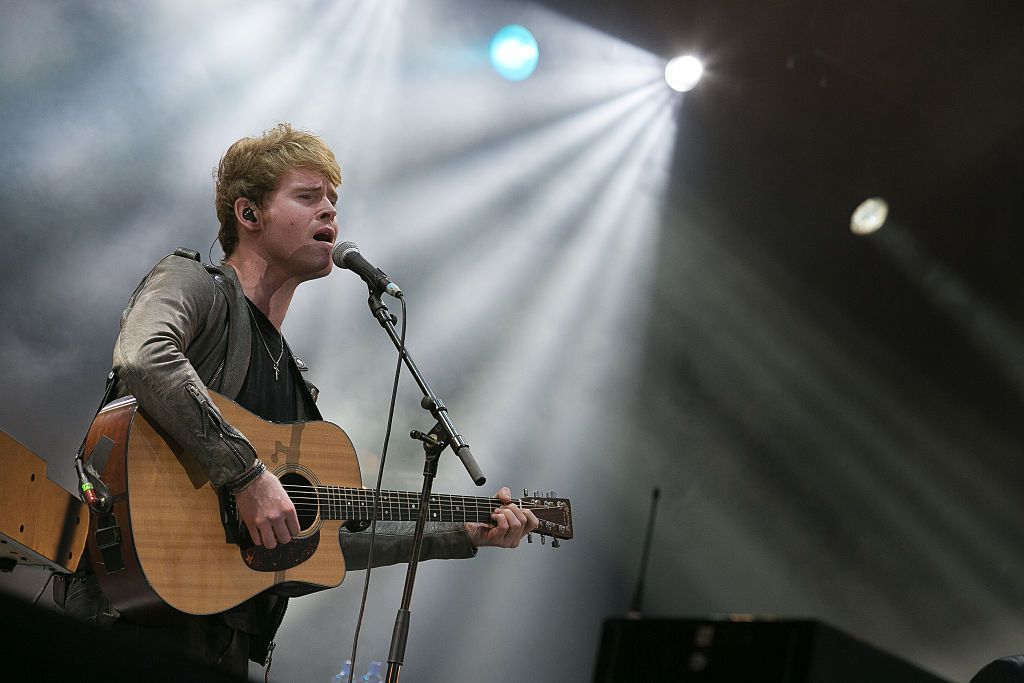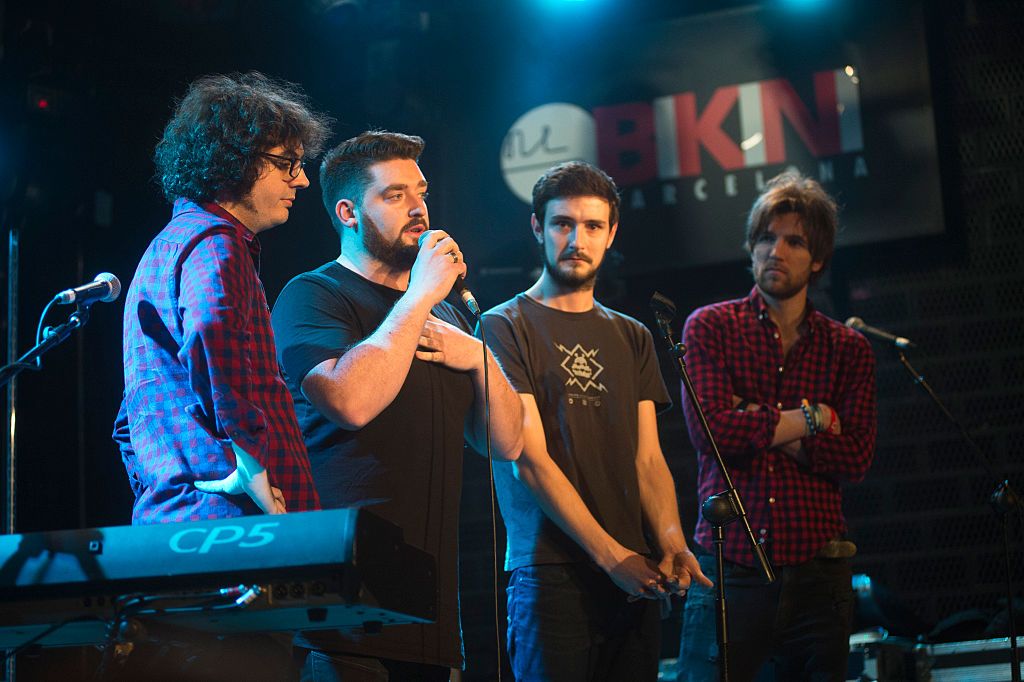

Share
16th October 2021
09:30am BST

 Steven Garrigan performs at Marlay Park, Dublin in July of 2016
Steven Garrigan performs at Marlay Park, Dublin in July of 2016
In terms of his own life, the contradiction is clear though no less compelling – how does a guy who can sometimes find it mentally draining to hold a friendly conversation get up onstage in front of thousands of people, night after night, city upon city, and project so much beyond the microphone? "It never gets old," he smiles, knowingly, thankful for his lot in life. "I think I have to pinch myself all the time. When I’m onstage it can probably seem that I’m really extroverted or that I’m super confident but I’m kind of hiding behind the song and the music. When I do come off stage, I’m a shy, introverted guy and I’d prefer to chat to a few people and then quietly step out and that’s okay but it’s taken me a long time to actually be comfortable with that. "Music, for me, has always been that safe place," Garrigan continues. "For the first few years, any live performance that we would do, for the most part of the show I’d probably have my eyes closed and it’s taken a long time to get used to that but I would kind of just get lost in the music and go somewhere else. It’s escapism for me. I don’t think I could stand in front of a crowd that big and just talk. That scares the living hell out of me. But if I’m hiding behind a song, it’s all good and it feels right. I love it. It’s a passion. "At the same time, I’ve done a lot of shows and there have been shows where I wouldn’t have wanted to do the gig that night but I’d still go and do it because it’s me and it’s the band and all our crew are there and I feel like I have a duty to do that, for everybody," he nods. "It was never onstage that I would have issues. That was a breath of fresh air – I’d get lost in music. But when I came offstage, backstage, there’d be label people, promo people, radio people – all these people or guests and straight after we’d be chatting and it was there that I found it incredibly difficult, sometimes even to hold a conversation. "I’d have to leave and step outside or just get away. I was kind of doing that for years. I suppose it was avoidance, in a way. That was down to anxiety. I grew up with social anxiety which is just that – kind of a fear of people, in a way, which is very odd for a frontman in a band. But over the years I’ve gotten a better grasp on it and I’ve kind of just learned to accept myself for who I am, flaws and all – not that it’s a flaw. Therapy has helped me get a better handle on it.""I’ve gotten a better grasp on it and I’ve kind of just learned to accept myself for who I am, flaws and all – not that it’s a flaw."
 Justin Bieber performs at Hyde Park in July of 2017
I put it to him that perhaps we, as fans, place undue pressure on the artists we love, or at the very least rarely take the time to appreciate what they may be going through. Music is an exceptional healer and companion but the conversation, by its design, is fairly one-sided.
The example of Justin Bieber comes up. Back in 2017, the Canadian superstar cancelled the remaining 14 dates of his Purpose world tour, having played 150 shows in 40 different countries up until that point. Unsurprisingly, the guy was exhausted. This writer saw him on that tour in Dublin, clearly burned out and fed-up as he grimaced through tired motions.
Bieber's subsequent call to end the run early – "I want my mind heart and soul to be sustainable," he offered by way of explanation – was met with both praise and criticism, with those in the latter camp declaring him selfish and noting that crew members were now suddenly out of work due to bratty petulance. We claim to care about mental health until we don't. We're good that way.
That's just one anecdote of an artist on the precipice. The pressure, no matter your station, can be immense. Throw in personal demons that don't go to sleep when you need them to and the intensity can only rise.
Garrigan has been there. Before a show in Barcelona in 2016, he was struck by a "really edgy feeling" that he was unable to shake. Minutes before Kodaline were due onstage, he lay down on the floor of his dressing room and realised he wouldn't be able to go on. His bandmates told the sold-out crowd that the gig was off.
"By now the physical symptoms were so overwhelming that even though a part of me knew it was a panic attack, it got to the point that I told Lewis [Thorn, tour manager] to call me an ambulance," Garrigan writes in High Hopes.
The sensation would eventually subside and the frontman would return to work the following night in Madrid but something had changed within him forever. The fragility couldn't be ignored.
Justin Bieber performs at Hyde Park in July of 2017
I put it to him that perhaps we, as fans, place undue pressure on the artists we love, or at the very least rarely take the time to appreciate what they may be going through. Music is an exceptional healer and companion but the conversation, by its design, is fairly one-sided.
The example of Justin Bieber comes up. Back in 2017, the Canadian superstar cancelled the remaining 14 dates of his Purpose world tour, having played 150 shows in 40 different countries up until that point. Unsurprisingly, the guy was exhausted. This writer saw him on that tour in Dublin, clearly burned out and fed-up as he grimaced through tired motions.
Bieber's subsequent call to end the run early – "I want my mind heart and soul to be sustainable," he offered by way of explanation – was met with both praise and criticism, with those in the latter camp declaring him selfish and noting that crew members were now suddenly out of work due to bratty petulance. We claim to care about mental health until we don't. We're good that way.
That's just one anecdote of an artist on the precipice. The pressure, no matter your station, can be immense. Throw in personal demons that don't go to sleep when you need them to and the intensity can only rise.
Garrigan has been there. Before a show in Barcelona in 2016, he was struck by a "really edgy feeling" that he was unable to shake. Minutes before Kodaline were due onstage, he lay down on the floor of his dressing room and realised he wouldn't be able to go on. His bandmates told the sold-out crowd that the gig was off.
"By now the physical symptoms were so overwhelming that even though a part of me knew it was a panic attack, it got to the point that I told Lewis [Thorn, tour manager] to call me an ambulance," Garrigan writes in High Hopes.
The sensation would eventually subside and the frontman would return to work the following night in Madrid but something had changed within him forever. The fragility couldn't be ignored.
 Kodaline band members Vinny May, Jason Boland and Mark Prendergast address the crowd at Bikini in Barcelona on 4 March, 2016 as the show is cancelled
Kodaline band members Vinny May, Jason Boland and Mark Prendergast address the crowd at Bikini in Barcelona on 4 March, 2016 as the show is cancelled
"We’ve done so many shows and there have been points where I’d be talking to myself before a gig – ‘How am I going to do this? I don’t think I can actually physically do this’ – but then adrenaline kicks in and I’ve always gotten through it, for the most part," Garrigan nods. "But I think it’s vitally important to look after yourself on the road. For the first few years, we were kind of like a deer in the headlights. Every show was amazing, there were parties after the shows, our friends would come over and visit but for them it was a big party and a session. They’d be on holiday. We have a job to do. We have shows to do. But that never came into it. "So, we kind of got caught up in that for a while but it’s taken me years to actually put a bit of structure on touring. The last few tours I’ve done, I’ve just been working out and looking after myself and doing whatever it takes to keep myself well and in good form. "That really helps and I actually enjoy that far more than the early-day sessions," he says. "I’d still go for a pint the odd time but it can be incredibly gruelling. Justin Bieber, he’s like a global superstar. I know how difficult it can be but at his level? God knows. I’d feel for somebody who is burnt out because it can easily happen on the road. It’s not all plain sailing. It’s busy, busy, busy, busy. There’s flights, there’s jet lag, there’s lots of interviews, you’re in a different country every day. "At one point, for me, a flight was like a taxi. You’re just kind of, ‘Oh yeah, where are we going? Oh, we’re going to Germany. Okay, where are we going after that? Yeah, we’re going to Switzerland and then we’re flying over to New York. Alright, cool. And what’s the schedule like? Ah yeah, cool.’ It’s just like… crazy," he laughs. Crazy, certainly, but that's the job. Something more conventional likely wouldn't suit, despite some grandfatherly assurance that Garrigan could have made a good member of An Garda Síochána. It's tempting, for a moment, to imagine an alternative universe in which Sergeant Garrigan is filling out paperwork on a Saturday night. "I don’t think I ever would have been a guard," he smiles. "My grandad was very much the type of guy, you know; ‘Get your job, government jobs are safe and you have a pension’ and all that stuff. So he was like – be a guard, be a fireman. But I don’t think I would have had it in me. "I was in college, I was doing economics and law and politics in DCU, which I wasn’t interested in. I probably would have finished something… I’d say I’d be in an office somewhere and going home and playing music or possibly playing in a bar at weekends or something like that. I definitely wouldn’t be a guard and I wouldn’t be a sergeant.""Our friends would come over and visit but for them it was a big party and a session. They’d be on holiday. We have a job to do."
 Steve Garrigan onstage at V Festival, August 2015
Steve Garrigan onstage at V Festival, August 2015
Since leaving those initial indentations on those piano keys, music has always been the journey for Garrigan. As he's gotten to know himself better and both accept and challenge his personal conflicts, the relationship has, perhaps inevitably, taken on a different form. "When we first released an album I said in a lot of interviews that music isn’t just music; it’s therapy," he explains. "Which was true at the time, because it was for me. That was the only outlet I actually had. I was in this constant state of anxiety and I wasn’t talking about it and I was running away from it. My way of running away from it was sitting at a piano and singing or playing music, writing songs. I really, really fully believed that it was therapy for me. "Now, it can help and there is a thing called music therapy that actually is really good for your mental health but for me now, today, therapy is therapy and music is music. If I fall into a bit of hole or if I feel I’m slipping a little bit, I will go straight back to therapy." He admits to falling out of love with music at a certain point, surely a nightmare scenario for anyone in his position. Yet today he is composed and collected on that front, recognising a new balance. As he said earlier – it never gets old. It just might change a little bit, and that's okay. "To be brutally honest, if I’m not in a good place I usually sit down and I’ll just start writing something," he says. "And it doesn’t really bother me if it’s not good. Sometimes it is, sometimes it isn't. That’s kind of the first thing I’ll do. There have been points, there was a point over the years where I completely fell out of love with music. Obviously because of touring and all that stuff but that was also partly due to the anxiety and what I was going through. "But yeah, no, I’ll listen to… I have a record player at home; Bon Iver and Jeff Buckley and stuff like that, especially if I’m in a bit of a lull. James Blake as well – that type of music, kind of sombre and then I don’t know, Billy Joel, Bruce Springsteen. I love old-school stuff, singer-songwriter-y stuff. "One of my favourite songs of all time and I think it’s really empowering and it’s a song with a great message – ‘A Change is Gonna Come’ by Sam Cooke. I think that’s one of the best songs ever written. I know what it was written about but for me it just feels like a hope is gonna come or something. I love listening to that song; it cheers me up. Either sitting at a piano or listening to music, I'm totally obsessed with music. I don’t know what I would do without it, to be honest." High Hopes is out now in paperback via Hachette Books Ireland"There was a point over the years where I completely fell out of love with music."
Explore more on these topics: